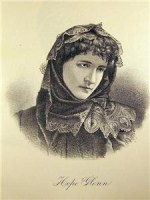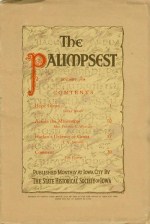As with anyone who in
times past picked up pen and paper to record their thoughts,
Laura chose writing as a way to keep her voice alive long
after she had departed. The culmination of this
writing came in 1981 with the publication of
Lichgate on
High Road where she related her memories of the special
place she created in the shadow of the great oak.
Within its pages we see the oak for the first time amongst
grasses and wildflowers of an overgrown field and feel the
weight of stones necessary to anchor the dreams she had.
The cottage itself emerges from rough-hewn ancient wood
surrounded by birds and holly while lights flicker in its
leaded windows and outside the ferns turn the branched arms
of the oak green with each rain.
Self-publishing
the book, Laura flung it into the corners of the globe
knowing that many would be lost but that a few would fall on
fertile ground for future generations to find and read.
Though a scant 55 pages in its initial form, the care she
expressed in even individual words is evident. One
such word leaps off the first page of the manuscript,
palimpsest. Foreign to the modern
tongue, most readers flee to a dictionary to learn that it
means a page of manuscript on which the writing has been
erased so that it can utilized again.
Laura’s choice of this
word was neither accidental nor pretentious but instead
represented a bookend to her writing, a bookend with its
beginning in the year 1933. Laura was then a graduate
student at the University of Iowa and excited about the
prospects of her first article being published. She
had written an
article detailing the life of Hope Glenn, another young
woman from a small Iowa town who in the previous century,
left her rural roots to sing opera on the stages of Europe. Hope’s
story echoed the desires of Laura who growing up on a dairy
farm in the same small town, dreamed of literature and
destinations far over the horizon. The magazine that
was to print the article in January, 1934, was published by
the State Historical Society of Iowa and was called The
Palimpsest.
roots to sing opera on the stages of Europe. Hope’s
story echoed the desires of Laura who growing up on a dairy
farm in the same small town, dreamed of literature and
destinations far over the horizon. The magazine that
was to print the article in January, 1934, was published by
the State Historical Society of Iowa and was called The
Palimpsest.
Forty-six years later as Laura sat in her chair beside the wide window overlooking her beloved oak, she remembered those youthful dreams and her first published article and in doing so penned these words, “O triumphant and transporting thought, that some antiquary in years to come should unearth Lichgate on High Road and consider it a site memorable in the annals of Tallahassee, that he should conclude not that in Tallahassee, (Old Town of the Indians), he had discovered arrowheads, stone chisels, shards of pottery, or that he had found ruins of a somewhat later period, cannonballs and muskets in what was presumably the Spanish fort of San Luis, but that, exhuming Lichgate, he should imagine he had found himself among the shades of Tudor England of the sixteenth century, when Henry VIII and his daughter Elizabeth walked the earth and the Old Globe echoed the meters of Shakespeare. Palimpsests of ancient days have recorded such erroneous observations.”
